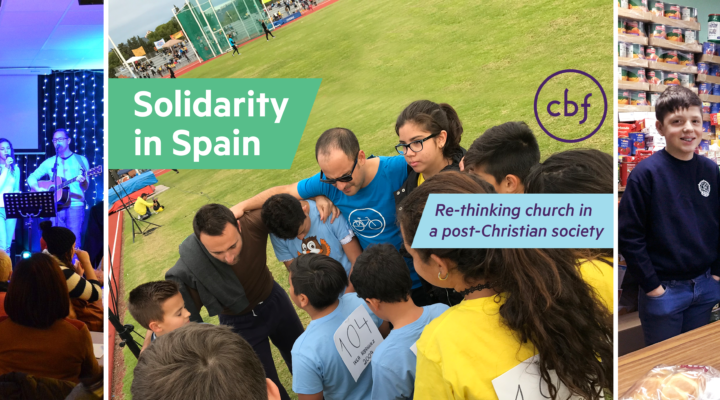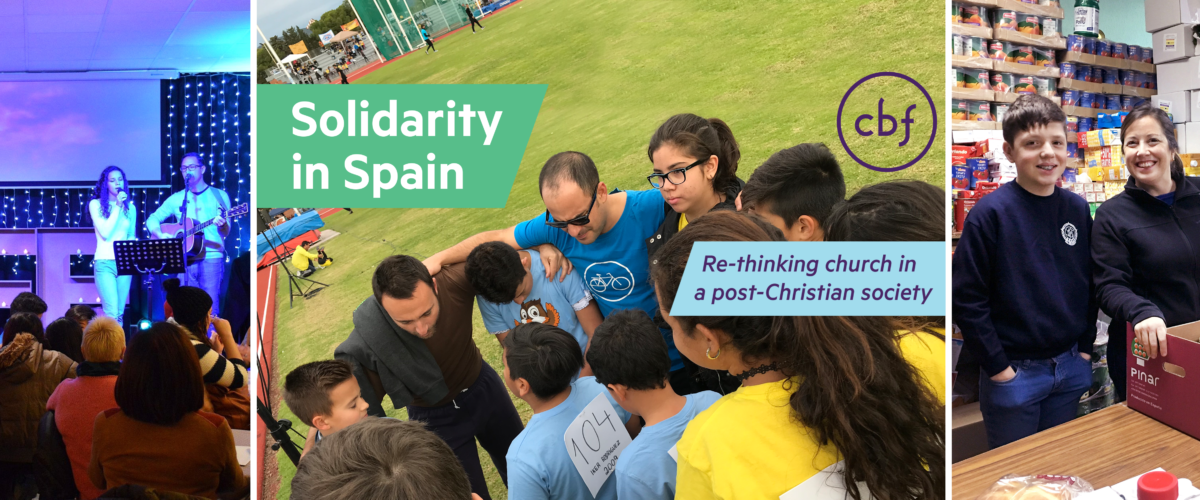By Ashleigh Bugg
In Spain, Cooperative Baptist Fellowship field personnel Michelle and Matt Norman have learned to navigate the complex political and theological climates of a region clamoring for independence. After nearly five years, the family of four continues to learn from local and international community partners.
“One of the things we love about the Spanish and Catalan people is that they really have a mindset of solidarity,” Michelle said. “They stand alongside one another. They want their community to be better. They want to stand with those in the margins.”
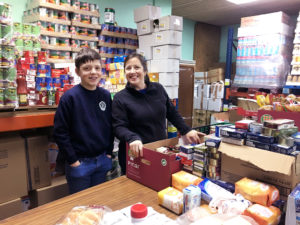
Michelle Norman and son, Aaron, prepare boxes of food for individuals with economic needs in Cerdanyola. The ministry provides food once a week to community residents.
Spain is composed of 17 autonomous regions, and the Normans live in Sant Cugat del Vallès, a tranquil village on the outskirts of Barcelona, a city of 1.6 million. Their home is in Catalonia, a region that has been featured in international headlines for its decades-long push for independence. In this place, the Normans must understand the diverse ways that tradition, politics and language play into their interactions with local people and other immigrants.
They work to balance a mix of traditions, from the immigrant churches of Latin America, Asia and Africa, to Spanish Protestant churches struggling to find their place in a post-Christian society, to secular nonprofits and individuals who are often skeptical of religious organizations. The Normans collaborate with everyone.
“In churches, it can be a challenge because you have a clash of cultures,” Matt said. “Not only do you have the Spanish culture and the Catalan culture, but you have immigrant cultures. People bring with them traditions from their home countries about how services are supposed to be about theology.”
Although the Normans initially thought they would be working with refugees, they found their work has become focused on helping Protestant Spanish and immigrant churches engage the local culture. They partner with four distinct churches: One is an international congregation with 40 countries represented. Another conducts its services in Catalan, a language distinct from Castilian Spanish. Michelle has begun learning Catalan, and their children, Cayden and Aaron, are fluent. But this has been another learning curve.
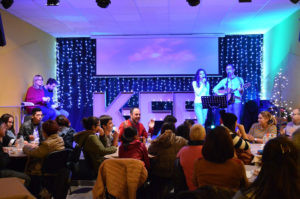
Matt Norman and daughter, Cayden, provide special music at a K-Fe service at Missió Sant Cugat. Attendees are seated around tables to facilitate discussion during this casual service.
“The Catalan church is unique in this day and age in that they speak only in Catalan, and their services are in Catalan, but churches in Spain today really only exist because of immigration,” Matt said. “The Spanish people have left the church behind. They are what you call a ‘post-Christian country’. If it weren’t for people from Latin America, Africa and Asia, the Protestant church and even the Catholic Church would be almost nonexistent.”
Despite this cultural clash, progress has been made as the three distinct groups — immigrant churches, Spanish churches, and secular nonprofits and individuals — are learning to work together.
“The bulk of our work tends to be relationship-building and helping the minority Christian group connect with the majority who are not Christian,” Matt said.
“Our largest work is helping the church reimagine what evangelism and church look like in a post-Christian culture,” Michelle added.
This is done in several ways and through ministries led by the four church partners, as well as social initiatives headed by local government entities and nonprofits.
“It’s done with leaders in churches and pastors. It’s done during ordinary coffees with people who want to live out their faith,” Matt said. “We’re trying to allow people to articulate their faith in ways the culture can hear.”
Michelle explained that in a European context this is often done through the government or other groups.
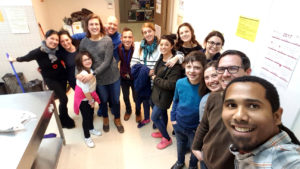
The Norman family and friends take a selfie with Pastor Nelson (front right) of Iglesia Cristiana del Garraf.
“The idea of social justice issues is not a cause that the church has often championed here,” she said.
However, most churches the Normans work with have started social ministries and are working to engage the community.
“What we are finding is that when churches begin to engage in different social ministries, purely for the sake of solidarity and because this is what Christ calls us to do, it creates a connection point with people outside the church who also feel passionate about these things,” Michelle said. “It’s awakening an interest among people who are not otherwise interested in the church because they think the church holds no purpose.”
Matt agrees that engaging people through their context is important to help all groups move forward and form together.
“We find when we engage with people in a manner where we genuinely seek to understand them, they are interested in Christianity, spirituality and exploring what faith might be,”
Matt said. “They ask us questions; they want to know more. We think it’s a manner of learning how to listen and how to engage in a respectful matter that invites others into conversation.”
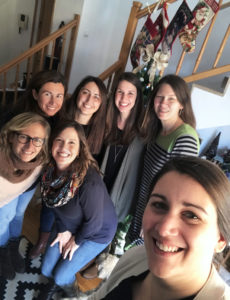
CBF field personnel Michelle Norman (pictured second front left) hosts a weekly Bible study for women. Each week the group gathers to learn together over hot tea, coffee and pastries.
Matt and Michelle walk alongside individuals and institutions, seeking understanding.
“It’s walking alongside them saying: ‘You understand this place better than we do because you’re from here; but let’s work together to understand what church should be,’” Matt said.
Spanish locals ask the Normans about their work and are often surprised by the message of Jesus Christ.
“They say, ‘How come no one ever told me that Jesus called us to do these things in solidarity: to help the poor, to feed the homeless?’” Matt said. “That’s what Jesus did; he healed the sick and came alongside those who are marginalized.”
“They’ve never experienced a grace-filled faith,” Michelle said. “They’ve experienced a guilt-filled expression of religion, but they’ve never experienced something that is liberating and grace-filled and intelligent.”
The Normans’ partnerships have encouraged local churches to see things from a secular perspective to best serve the community.
“It’s a connection point for our churches to learn from people outside the church because outside the church they often do things better than in the church [in Spain],” Michelle said. “Our churches grow and learn to be more like Christ from people who are outside the church. They see the Gospel with new eyes.”
Spanish and Catalan cultures have important questions that cannot be answered with automatic responses.
“This culture we find has lots of good questions about the intersections of religion and science, politics and life and suffering,” Michelle said. “Authentic, honest questions. Often the church doesn’t know or hasn’t been able to engage with these questions.”
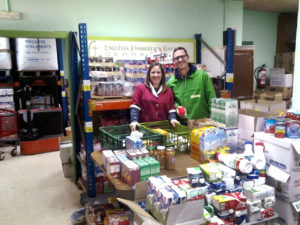
Michelle and Matt Norman have assisted with weekly food distribution at Iglesia Bautista de Cerdanyola since their arrival in Spain five years ago.
“Or they have a list of answers ready,” Matt said. “It’s okay to not immediately jump in with answers and let people live with the doubt so faith starts to emerge. Without that moment of questioning, doubt and insecurity, what’s the need to have faith?”
The Normans try to engage people in a way that gives them the ability to seek answers with safety. They’re able to ask questions, and the Normans can point to ways they might investigate the Bible and see what they think about it for themselves.
“This allows them to develop a faith, rather than learn a doctrine,” Michelle said.
One of the ways the Normans have experimented with this idea is through K-Fe service. A play on words merging the words for café and the Spanish word for faith, the K-Fe service draws on Spain’s café culture to foster community and questions about theology and faith.
“The idea behind K-Fe service is to do something in a way that is different than what we usually do in church,” Matt said. “We are thinking about how we engage people in topics so they begin to think about them theologically and relate them to everyday life.”
The team, comprised of members of the Normans’ weekly community group, picks a theme, asks questions and then gives participants time to engage with people around them. It starts with a familiar topic and then progresses. A moderator helps make sure conversation continues.
“The idea is to help people see that God is working in everyday life, that people are searching for certain things we all have in common,” Matt said. “Since Spain is such a café culture, it really fits.”
According to Michelle, Spain is a place where people regularly sit, talk and are in relationship with one another.
“Where it’s counter-cultural, but where people are really interested, is the idea of learning together in conversation,” Michelle said. “Typically, in church, you don’t have time for dialogue. We are allowing people to participate in the sermon. It has been a lot of fun to see this idea grow.”
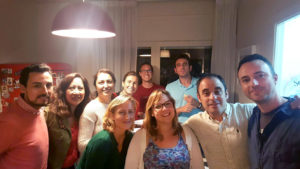
CBF field personnel Matt Norman (back center) with weekly community group of K-Fe Service team.
The Normans are also excited about a women’s Bible study and their work mentoring young pastors and leaders. It is informative for them to learn from people who did not grow up in church.
“You can’t ask ‘church’ questions. You have to think bigger and think about community. Ninety-nine percent of people don’t go to church, so you have to think about how to be the church in that kind of environment,” Matt said. “And how to engage people in a relevant way.”
Despite cultural differences, the Normans and the groups they work with are learning from one another and serving the community together.
“There’s a sense, even when you’re not from here that when you walk through this journey with people, people feel very close,” Michelle said. “I feel more a part of the community here because we’ve walked this way [together]. We’ve gone through the terrorist attacks in Barcelona. We’re going through this struggle to see what comes next as Catalonia goes forward. There is a sense of solidarity that we are going through this together.”
Give to support CBF field personnel like Matt and Michelle Norman serving around the world to serve and share God’s love. Give today at www.cbf.net/presence
Read more stories of ministry and missions in the Summer issue of fellowship! magazine, the quarterly publication of the Cooperative Baptist Fellowship. Subscribe for free here. Learn more about CBF at www.cbf.net.

